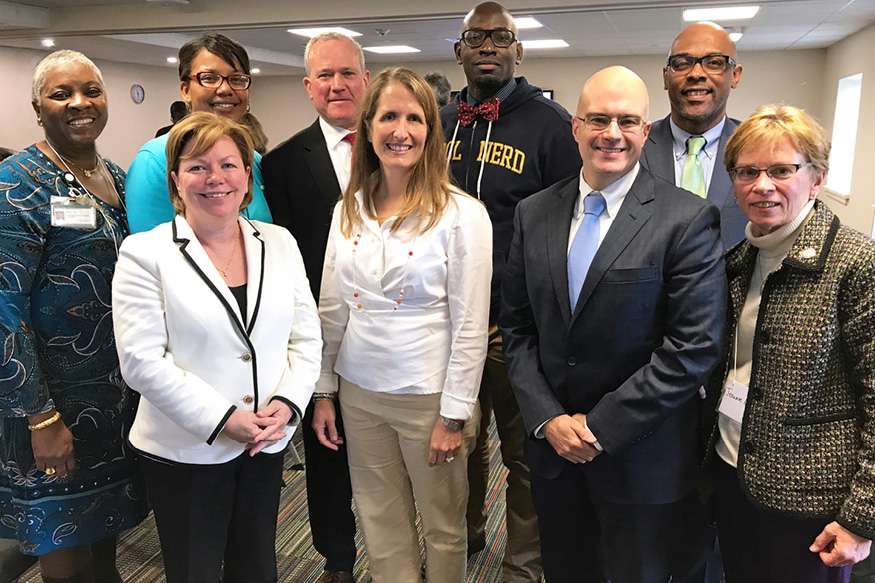
The Westchester-Putnam Workforce Development Board presented a high-level learning and discussion symposium on October 24, at the Mount Vernon Career Center. The event hosted professional panelists from recruiting, workforce development, colleges, economic development, and area businesses to delve into the issues concerning the current talent shortage.
Employers of all sizes and sectors as well as non-profit and educational organizations attended the free symposium to explore how county agencies partner with local colleges, staffing professionals, and HR managers to help private employers address the talent gap and provide career paths with state-of-the-art technology, innovative training approaches, resources and services to youth, adults and employers.
Pictured above left to right: OJ Yizar, Manager, Westchester Career Center; Bridget Gibbons, Director, Westchester County Office of Economic Development; Dr. LaTasha Hamlett-Carver, Program Specialist, Westchester Career Center; Thom Kleiner, Director, Westchester-Putnam Workforce Development Board; Allison Madison, President, Madison Approach Staffing; Orane Barrett, Kool Nerd Club; Joseph DiCarlo, MBA, SPHR, Chief Talent and Engagement Office, WESTMED Practice; Dr. Sterling Jasper, Owner, Express Employment Professionals; Jeanne Maloney, Assistant Dean Workforce, Westchester Community College
Allison Madison as moderator kicked off the lively discussion by asking the panel “Describe the kinds of positions being hired for and how the talent gap or shortage is impacting each of your respective sectors?”
“We need to be more proactive and reactive at the county level. For example, we’re working closely with the Mount Vernon Career Center and Westchester Community College to help a hospitality company find cooks and front desk staff. We’ve put together a two-week rapid response training program to bring people in, get them interviewed, trained and on the job. We need to do more of that,” added Bridget Gibbons, Director, Westchester County Office of Economic Development.
“It’s great to aspire to go to college, but that’s not the only route to get a great job. We need to work with our educational institutions to get them more information about the varying routes to certain jobs, how to get credentials, the certifications, not only from four-year colleges but the community colleges and BOCES,” expanded Thom Kleiner. Director, Westchester-Putnam Workforce Development Board
“Sound tech, radiology tech, lab tech—these are roles within the healthcare industry that pay a good income for 12 to 18 months training. We need to work with the institutions of learning and government officials to inform and educate our young people as to what fields are in demand. A lack of qualified workers impacts us as a business and affects the economy and our ability to deliver quality healthcare, because if we don’t have the right people, we can’t grow,” explained Joe DiCarlo, MBA, SPHR, Chief Talent and Engagement Office, WESTMED Practice.
Topics explored included innovative ideas like returnships and rapid response training as well as observations on the lack of soft skills in the millennial workforce, recommendations for earlier career exploration at the high school level, informing students of real-world job opportunities and alternative career pathways utilizing community colleges and BOCES for certifications and credentials in addition to 4-year degree graduate programs. Audience members pointed out the need for a return to technical schools and a need to include representatives from school districts.
“Symposiums like the one we held today are very important because it brings together experts from government, staffing services, secondary and higher education, and the private sector to dive into the talent shortage topic,” explains program specialist and organizer of the symposium, Dr. LaTasha Hamlett-Carver. “We have to all be in the room together to brainstorm solutions as these are systemic issues that no one can solve by themselves. We plan to do more of these.”
